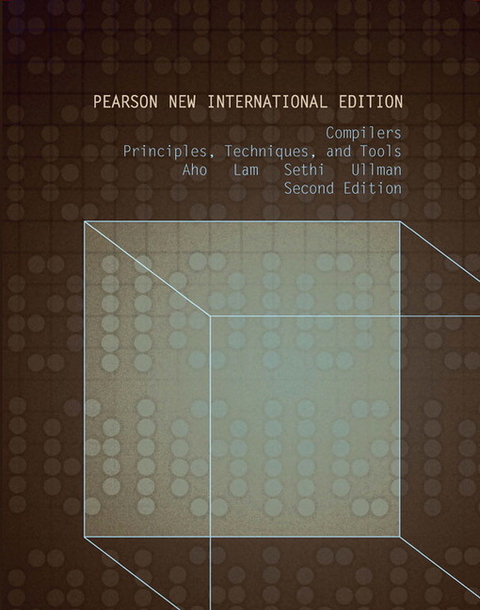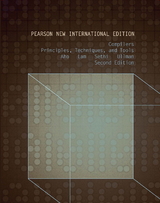Compilers: Principles, Techniques, and Tools
Pearson Education Limited (Verlag)
978-1-292-02434-9 (ISBN)
1 Introduction
1.1 Language Processors
1.2 The Structure of a Compiler
1.3 The Evolution of Programming Languages
1.4 The Science of Building a Compiler
1.5 Applications of Compiler Technology
1.6 Programming Language Basics
1.7 Summary of Chapter 1
1.8 References for Chapter 1
2 A Simple Syntax-Directed Translator
2.1 Introduction
2.2 Syntax Definition
2.3 Syntax-Directed Translation
2.4 Parsing
2.5 A Translator for Simple Expressions
2.6 Lexical Analysis
2.7 Symbol Tables
2.8 Intermediate Code Generation
2.9 Summary of Chapter 2
3 Lexical Analysis
3.1 The Role of the Lexical Analyzer
3.2 Input Buffering
3.3 Specification of Tokens
3.4 Recognition of Tokens
3.5 The Lexical-Analyzer Generator Lex
3.6 Finite Automata
3.7 From Regular Expressions to Automata
3.8 Design of a Lexical-Analyzer Generator
3.9 Optimization of DFA-Based Pattern Matchers
3.10 Summary of Chapter 3
3.11 References for Chapter 3
4 Syntax Analysis
4.1 Introduction
4.2 Context-Free Grammars
4.3 Writing a Grammar
4.4 Top-Down Parsing
4.5 Bottom-Up Parsing
4.6 Introduction to LR Parsing: Simple LR
4.7 More Powerful LR Parsers
4.8 Using Ambiguous Grammars
4.9 Parser Generators
4.10 Summary of Chapter 4
4.11 References for Chapter 4
5 Syntax-Directed Translation
5.1 Syntax-Directed Definitions
5.2 Evaluation Orders for SDD's
5.3 Applications of Syntax-Directed Translation
5.4 Syntax-Directed Translation Schemes
5.5 Implementing L-Attributed SDD's
5.6 Summary of Chapter 5
5.7 References for Chapter 5
6 Intermediate-Code Generation
6.1 Variants of Syntax Trees
6.2 Three-Address Code
6.3 Types and Declarations
6.4 Translation of Expressions
6.5 Type Checking
6.6 Control Flow
6.7 Backpatching
6.8 Switch-Statements
6.9 Intermediate Code for Procedures
6.10 Summary of Chapter 6
6.11 References for Chapter 6
7 Run-Time Environments
7.1 Storage Organization
7.2 Stack Allocation of Space
7.3 Access to Nonlocal Data on the Stack
7.4 Heap Management
7.5 Introduction to Garbage Collection
7.6 Introduction to Trace-Based Collection
7.7 Short-Pause Garbage Collection
7.8 Advanced Topics in Garbage Collection
7.9 Summary of Chapter 7
7.10 References for Chapter 7
8 Code Generation
8.1 Issues in the Design of a Code Generator
8.2 The Target Language
8.3 Addresses in the Target Code
8.4 Basic Blocks and Flow Graphs
8.5 Optimization of Basic Blocks
8.6 A Simple Code Generator
8.7 Peephole Optimization
8.8 Register Allocation and Assignment
8.9 Instruction Selection by Tree Rewriting
8.10 Optimal Code Generation for Expressions
8.11 Dynamic Programming Code-Generation
8.12 Summary of Chapter 8
8.13 References for Chapter 8
9 Machine-Independent Optimizations
9.1 The Principal Sources of Optimization
9.2 Introduction to Data-Flow Analysis
9.3 Foundations of Data-Flow Analysis
9.4 Constant Propagation
9.5 Partial-Redundancy Elimination
9.6 Loops in Flow Graphs
9.7 Region-Based Analysis
9.8 Symbolic Analysis
9.9 Summary of Chapter 9
9.10 References for Chapter 9
<
| Erscheint lt. Verlag | 2.8.2013 |
|---|---|
| Verlagsort | Harlow |
| Sprache | englisch |
| Maße | 206 x 281 mm |
| Gewicht | 2340 g |
| Themenwelt | Informatik ► Theorie / Studium ► Compilerbau |
| ISBN-10 | 1-292-02434-8 / 1292024348 |
| ISBN-13 | 978-1-292-02434-9 / 9781292024349 |
| Zustand | Neuware |
| Haben Sie eine Frage zum Produkt? |
aus dem Bereich




